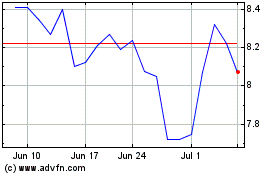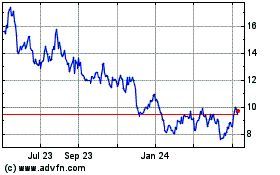After criticizing foreign companies from Apple Inc. to
McDonald's Corp. in past years, China's powerful state broadcaster
has taken aim at Alibaba Group Holding Ltd., ramping up pressure on
the e-commerce giant to tackle fake sales on its shopping
platforms.
In a two hour, prime-time broadcast Tuesday, China Central
Television said faking orders, or "brushing," as it is called in
China, remains widespread on Alibaba's largest shopping platform,
Taobao. The practice—which involves sellers paying people to place
fake orders—pads vendors' sales figures and boosts their standing
on online marketplaces.
An Alibaba spokesman said the problem plagues e-commerce sites
globally and that Alibaba "is continually upgrading our technology
to better detect and identify these practices."
The CCTV report comes at a time when Alibaba also faces
criticism from some Western brands that it isn't doing enough to
crack down on counterfeit goods on its platforms. Last week, the
company's co-founder, Jack Ma, told hundreds of Alibaba employees
that the company would spare no expense in ridding itself of
counterfeits.
Critics say the fake sales call into question the volume of
transactions conducted on Alibaba's platforms, a metric that has
been cited by analysts in declaring that the Chinese company is the
world's largest e-commerce platform. Alibaba counters that it uses
sophisticated tools to identify and exclude fake transactions from
its financials.
The CCTV broadcast is "definitely concerning," said Muzhi Li, a
senior analyst at Arete Research, who rates Alibaba's stock a
"negative." "To have this report about fake orders after Alibaba
made so many categorical statements on what they would do shows
it's still a major problem."
The 315 broadcast, as it is known in China for the date of
consumer rights day, has become an annual tradition representing
the rising power of consumers in an increasingly affluent country.
The show typically focuses on naming and shaming multinational
companies, a tactic that China typically uses to correct widespread
problems within industries, consultants say.
In 2013, CCTV's report led to an apology from Apple's CEO Tim
Cook after it accused Apple of skirting warranty periods and
adopting customer-service policies for Chinese customers that
differ from its practices in other countries.
This year's show, however, spared foreign firms and took a
lighter tone than in previous years. But it focused on e-commerce,
food-delivery services, mobile phones and secondhand car sales.
On the broadcast, CCTV criticized food delivery service Ele.Me,
a company backed by Alibaba, for working with substandard kitchens
and unregulated restaurants. The food company said on its
microblog, Sina Weibo, that it would review its business and remove
all violating restaurants from its service.
The broadcast also showed an undercover CCTV reporter setting up
a Taobao store and enlisting the services of brushing companies to
boost the store's ratings, with each fake order and rating costing
between five yuan and 10 yuan ($0.77-$1.64). "With money, there is
nothing you can't buy, a brusher told the journalist," a CCTV
announcer said, referring to the brushing practices for Taobao and
other platforms.
In November 2014, an article from China's state-run Xinhua News
Agency quoted Alibaba Vice President Yu Weimin as saying that the
company had found that 1.2 million sellers on its main Taobao
shopping site—or roughly 17% of all merchants—had faked 500 million
transactions worth 10 billion yuan ($1.5 billion) in 2013. Mr. Yu,
at the time, said those transactions were "only the tip of the
iceberg" and his "conservative estimate" was that tens of thousands
of people in China were helping online sellers fake transactions,
according to the article.
An Alibaba spokesman said Wednesday that the company has made
significant progress in tackling fake transactions, and is sending
a "strong message to unethical merchants: don't do brushing, you
will be caught."
The company is working with law enforcement, employing
sophisticated data analysis and lowering the ranking of stores—or
even shutting them down entirely—if they fake transactions, it
said.
In the month ended March 15, Alibaba said it had caught 220,000
sellers faking transactions on Taobao, a virtual bazaar where
anyone can set up a shop. More than 6,000 of these sellers had
their stores closed, while the rest saw their products displayed
less visibly in search rankings, according to Alibaba.
The practice of fake transactions is "not anything new," and
Alibaba appears to be doing everything it can to tackle the issue,
according to Tian Hou, founder of T.H. Capital, which rates
Alibaba's stock a buy.
Still, some Taobao sellers say that Alibaba's efforts to stamp
out brushing have been inadequate thus far.
"Taobao keeps saying that they'll solve the problem, but it's
very hard to solve," said Hua Qianzi, who opened a store on the
site four years ago, selling organic baby goods.
Ms. Hua said that those sellers who have thousands of dollars to
invest can easily buy better ratings for their stores. "It's not
very fair," she said.
Write to Kathy Chu at kathy.chu@wsj.com and Laurie Burkitt at
laurie.burkitt@wsj.com
(END) Dow Jones Newswires
March 16, 2016 09:15 ET (13:15 GMT)
Copyright (c) 2016 Dow Jones & Company, Inc.
Weibo (NASDAQ:WB)
Historical Stock Chart
From Mar 2024 to Apr 2024

Weibo (NASDAQ:WB)
Historical Stock Chart
From Apr 2023 to Apr 2024
